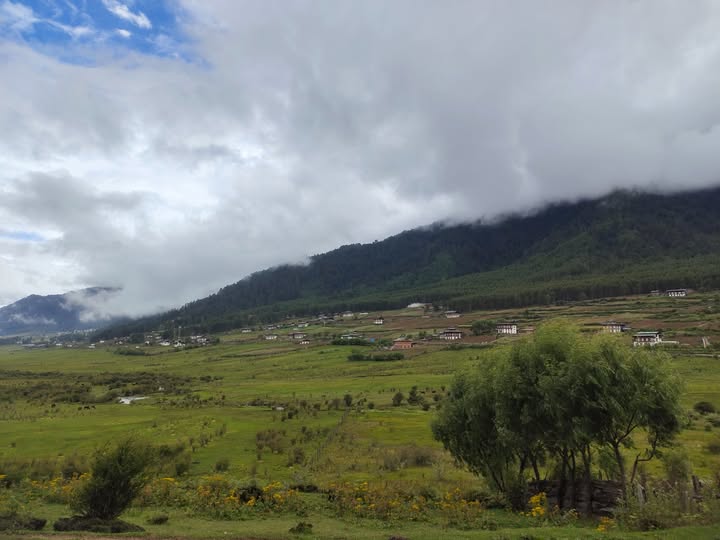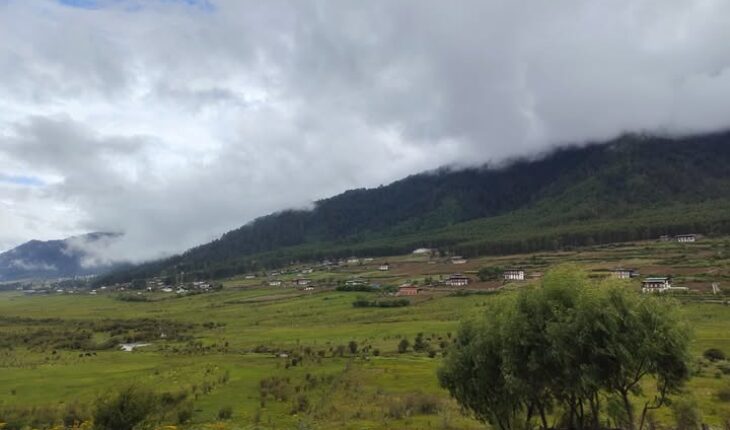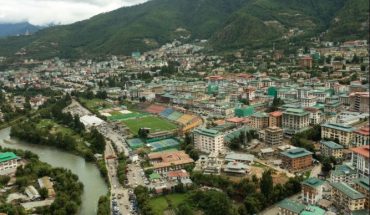
The picturesque Gangtey valley in Phobjikha is grappling with rising garbage issues
TIL BDR GHALLEY
Thimphu
Gangtey-Phobji, Wangdue Phodrang, one of Bhutan’s most ecologically significant and popular tourist destinations, is grappling with a persistent waste management crisis.
Despite monthly cleaning campaigns and financial contributions from the local community, the problem continues to escalate. Tourists have been seen voluntarily picking up litter, underscoring both the severity of the issue and the inadequacy of existing systems.
In response, the Ministry of Industry, Commerce and Employment (MoICE), through the Department of Tourism and in collaboration with other agencies, has introduced the Gangtey-Phobji Ramsar Site Management Plan 2025–2034.
The plan outlines structural, educational, and enforcement-based strategies to address increasing waste levels in the valley, which is home to the endangered Black-necked Crane and designated as a Ramsar wetland site.
“The Ministry recognizes the ecological sensitivity of the area, especially as a habitat for the endangered Black-necked Crane, and the long-term socio-economic value it holds,” said Lyonpo Namgay Dorji, Minister for MoICE.
The government’s strategy includes empowering local governance mechanisms, notably through the restructuring of the Gangtey-Phobji Environmental Management Committee (GPEMC).
The committee will be provided with clearer mandates, enhanced monitoring duties, and improved stakeholder coordination to support more effective waste governance.
To address existing infrastructure shortfalls, Wangdue Phodrang Dzongkhag has committed to constructing a sanitary landfill and procuring essential waste management equipment, including a garbage truck and compactor.
These measures aim to enhance waste collection, segregation, and disposal systems.
Educational campaigns targeting local communities, schools, and tourism operators will also be implemented to encourage responsible waste practices.
According to the Ministry, “Creative communication tools such as infographics, social media outreach, and school programs will be used to raise awareness.”
Special focus will be placed on engaging women and youth in community-led waste reduction, composting, and recycling initiatives.
Technical assessments will be conducted to evaluate the feasibility of installing integrated sewage and wastewater treatment plants for public facilities, homestays, and businesses.
These initiatives will be designed to protect wetland health and prevent groundwater contamination.
Monitoring and enforcement mechanisms will also be reinforced. The GPEMC will lead monthly waste audits and routine monitoring to ensure compliance with environmental regulations.
Color-coded bins will be introduced in public and commercial spaces to support waste segregation at the source, and non-compliance will be addressed under existing legal frameworks.
In parallel, the Department of Tourism is working with tourism sector stakeholders, including hotels, homestays, tour guides, and operators, to encourage more sustainable practices.
“The Department, with support from the private sector, conducts clean-up campaigns in key places, especially trekking routes, where there are high numbers of tourist visitation,” Lyonpo said.
Tourists have also taken part in informal clean-up efforts, with some visitors seen voluntarily picking up litter along trails and village paths.
While these actions reflect growing public concern, officials acknowledge that systemic challenges require institutional solutions.
Gangtey-Phobji’s waste problem has intensified due to increased footfall, economic development, and limited waste infrastructure. Community led efforts, while commendable, have proven insufficient to manage the growing volume and complexity of waste.
Experts have raised concerns that without immediate and coordinated action, the environmental degradation could threaten not only biodiversity but also the valley’s appeal as a premier eco-tourism destination.
The Ministry’s long-term plan includes several key recommendations: establishing a dedicated nodal agency to coordinate waste management, introducing agriculture-specific electricity tariffs, and promoting private sector involvement in system design and maintenance.
Innovative financing mechanisms such as cooperative lending, interest subsidies, and results-based grants are also being explored to support sustainable waste solutions.
MoICE emphasized that the success of the initiative will depend on strong local ownership, inter-agency collaboration, and consistent implementation.
“We continue to seek support from our partners to keep Bhutan clean,” Lyonpo stated, reiterating the importance of shared responsibility between government, communities, and private actors.
As domestic and international tourist arrivals to Gangtey increase, the need for comprehensive, inclusive, and enforceable waste management has become more urgent.
With the launch of the Gangtey-Phobji Ramsar Site Management Plan 2025–2034, officials aim to strike a balance between ecological preservation and socio-economic development, ensuring the valley remains both pristine and welcoming for generations to come.





